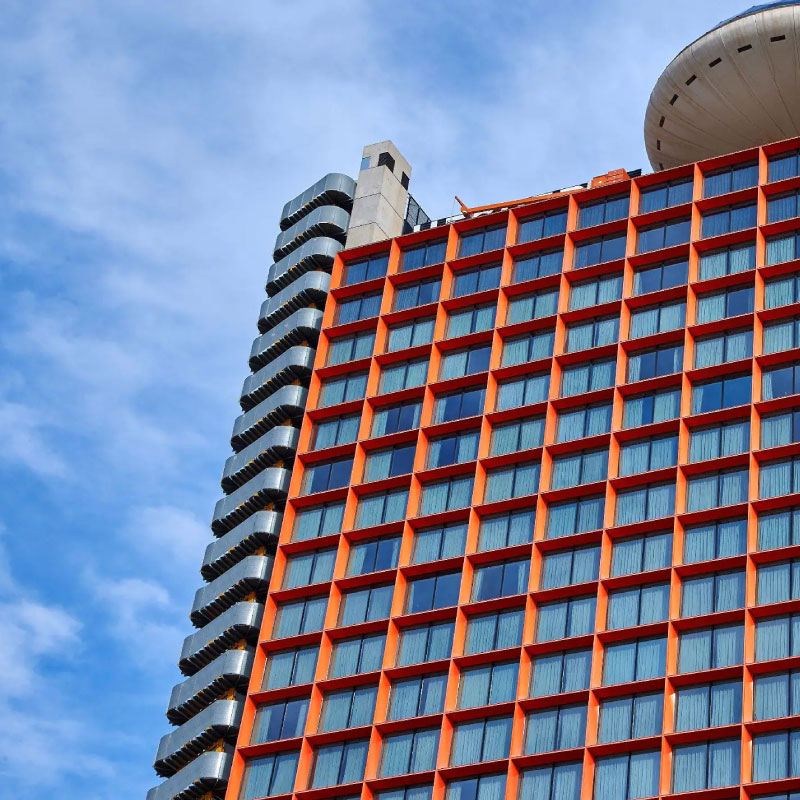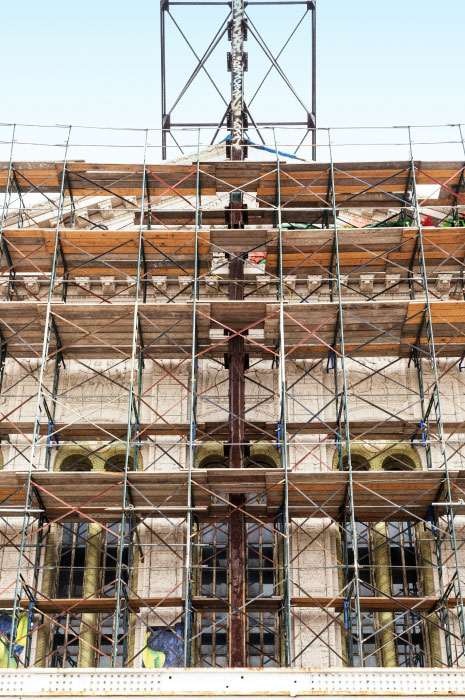Spain, being one of the most important tourist destinations in the world, occupying the second place after France. This causes a great need for solutions and infrastructures to respond to the great tourist demand in the country. For this reason, hotel refurbishment is emerging as a highly valued option in the real estate sector. In the same way, the growing interest in sustainability and the commitment to care for the planet has driven several real estate developers to refurbish hotels, with the aim of offering guests a quality service aligned with contemporary values and needs.


What is hotel rehabilitation?
What is hotel rehabilitation?

Hotel refurbishment is a strategy to modernize or refurbish hotel complexes, extending the useful life of buildings and adapting spaces to new social and guest needs. This process includes improvements to the building envelope, roof and floor, with the aim of improving insulation and promoting energy efficiency.
Hotel refurbishment is a significantly more sustainable alternative to building new infrastructure. This practice can reduce energy consumption and pollution by up to 60% compared to the construction of a new building. Refurbishment or retrofitting is based on improving an existing structure, using sustainable, local, durable and efficient materials.
Hotel refurbishment is a strategy to modernize or refurbish hotel complexes, extending the useful life of buildings and adapting spaces to new social and guest needs. This process includes improvements to the building envelope, roof and floor, with the aim of improving insulation and promoting energy efficiency.
Hotel refurbishment is a significantly more sustainable alternative to building new infrastructure. This practice can reduce energy consumption and pollution by up to 60% compared to the construction of a new building. Refurbishment or retrofitting is based on improving an existing structure, using sustainable, local, durable and efficient materials.
Aspects to rehabilitate a hotel
To carry out an effective rehabilitation of a hotel, it is crucial to perform a detailed analysis of the structure and its environment to find the most appropriate solution for the project. It not only focuses on improving the structural aspects, but also intervenes in the design and styling of the building.
Some of the aspects to be rehabilitated in a hotel are the following:
- Structure, enclosures, floors and exterior areas.
- Private and common areas, hall, rooms, bathrooms, restaurant, dining room and rest areas.
- Security devices and systems.
- Air conditioning and lighting.
- Domotics and communication system.
- Decorative elements.
The selection of quality materials is fundamental in the process of rehabilitation and refurbishment of hotels, guaranteeing their durability and ensuring the profitability of the work in the long term.
In short, hotel refurbishment seeks to implement energy saving and efficiency measures in the envelope, thermal installations and lighting of residential and hotel buildings, and to incorporate renewable energies in the installations.
Rehabilitation of buildings for co-living
In addition to the refurbishment of hotels, there has also been an increase in the refurbishment of buildings to transform them into communal housing, known as co-living. This trend is gaining importance in the hotel and real estate sector, not only as a response to the growing demand for flexible and affordable housing solutions, but also as a strategy to reduce the carbon footprint associated with the demolition and abandonment of habitable infrastructure.
Co-living offers an innovative solution that maximizes the use of existing spaces, promoting a shared, communal lifestyle that is attractive to young people, professionals, students and individuals seeking an alternative to traditional housing options. These retrofitted spaces often include common areas, such as shared kitchens, living rooms and workspaces, which encourages social interaction and a sense of community among residents.
The transformation of disused buildings into co-living dwellings also brings significant environmental benefits. By reusing existing structures, the generation of construction waste is avoided and the demand for new materials is reduced, resulting in less exploitation of natural resources. In addition, retrofitting these buildings with efficient and sustainable technologies contributes to greater energy efficiency and a reduction in greenhouse gas emissions.
Hotel rehabilitation as a tool for pursuing urban sustainability
Hotel rehabilitation is not only essential to maintain the infrastructure in good condition, but also to promote urban sustainability. The reasons for rehabilitating hotels go beyond structural aspects and include the need to pay attention to details and decorative elements that meet both aesthetic and functional needs.
Some of the most significant reasons for hotel refurbishment are:
- Adherence to new regulations related to carbon footprint and energy efficiency: it is essential for hotels to adapt to current regulations to reduce their environmental impact and improve their energy efficiency.
- Symptoms of an unstable structure: Rehabilitation is crucial to ensure that the building structure is safe and durable.
- Obsolete facilities: Updating facilities is necessary to provide quality service and meet current standards.
- Facade retrofitting: Upgrading facades not only has aesthetic benefits, but can also contribute significantly to the building's thermal efficiency.

In general, hotel refurbishment seeks to implement energy saving and efficiency measures in the building envelope, as well as in the thermal and lighting installations. It is a key tool to reduce environmental impact, improve urban sustainability and offer a more comfortable and efficient environment for guests. In addition, even if your hotel does not have any type of problem, it is advisable, for safety reasons, to carry out a continuous control and monitoring as our clients do at the Hotel Arts or Hesperia Towers.
Sustainability in the Hotel Sector
Having efficient and effective systems in place is essential for sustainable hotel refurbishment. Investments in this area must be recovered quickly, offering both economic and environmental benefits.
At SOCOTEC, we develop a comprehensive action plan for sustainable hotel refurbishment, starting with an energy audit of the spaces. This approach is complemented by a sustainable management plan associated with energy rehabilitation, ensuring that each project is environmentally responsible. We conduct environmental impact studies and propose architectural designs that guarantee efficient energy consumption. In addition, we promote the installation of renewable energy alternatives, all through a global plan segmented by phases to ensure the best processes and results.
Main services we offer at SOCOTEC:
- Obtaining grants and subsidies for the rehabilitation of hotels.
- Pathology studies and diagnosis
- Structural auscultation
- Master Plan and regenerative urban planning
- Facade rehabilitation
- Structural rehabilitation
- Conversion of spaces (from hotels to collivings/residential)
- Life Cycle Assessment (LCA)
- Carbon footprint and water footprint consultancy
- Fluid dynamic, fire and safety engineering consulting.
At SOCOTEC, we are dedicated to contributing to the sustainable development of the planet, offering added value to the end client. If you are looking for innovative and sustainable solutions for the rehabilitation of hotels and community buildings, do not hesitate to contact us so that we can evaluate your project and provide you with a customized solution. Together, we can build a greener and more efficient future.
Would you like us to advise you about our engineering services for the Hotel sector?

You might also be interested...




